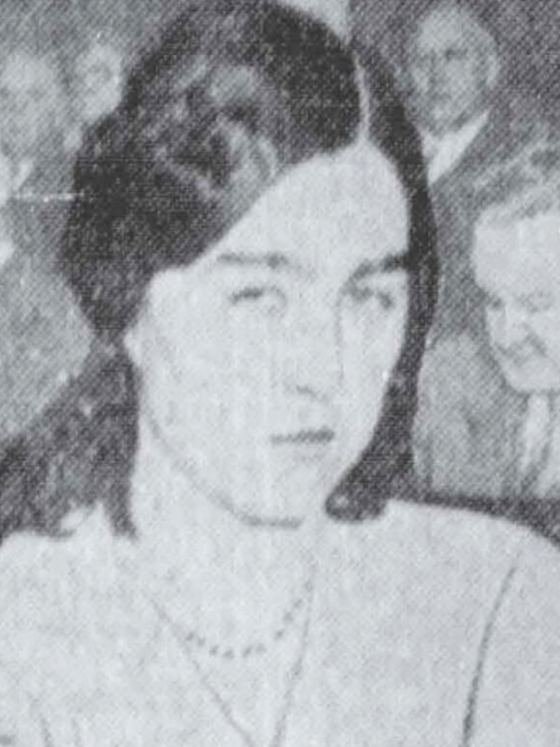In the Lake: The Murder of Teresa McAbee

On May 11, 1987, 11-year-old Teresa McAbee left her home with her mother in Mascotte, Florida to walk to a nearby Circle K convenience store to get a pencil to complete her homework. She never returned home. Worried, her mother went to the store to check on her daughter but couldn’t find her.
Later that night, Dorothy filed a missing persons report with police officer James Duckett. He took a photo of Teresa from Dorothy and made a flyer to pass out.
The Crime
The following morning, Teresa’s body was found partially submerged and facedown in Knight Lake, less than a mile from her home. She had been strangled and drowned. A medical examiner would later claim she had been sexually assaulted, having found blood in her underwear and semen on her jeans.
An investigation into her murder began immediately. It wasn’t long before the police caught their first big break by identifying the tire tracks that led to where Teresa’s body had been found. The tire marks left behind were similar to the tires used on two of the patrol cars used by the Mascotte police department. At the time of Teresa’s murder – around 11 pm – there was only one police officer on duty: James Duckett.
When questioned, Duckett claimed to have seen Teresa at the Circle K, talking to an unnamed 16-year-old boy doing laundry next door while waiting for his uncle to pick him up. Duckett went inside the store to ask the clerk for Teresa’s name and age. The 16-year-old clerk would testify that he saw Duckett place Teresa in the passenger side of his patrol car and shut the door before going to the driver’s side. However, Duckett would tell investigators that he let Teresa out of his patrol car at Circle K, told her that she needed to go home, and did not see her again after she walked around the side of the store.

While no evidence was found of Teresa being inside Duckett’s patrol car, her fingerprints were found on the hood, commingled with Duckett’s. Furthermore, one lone pubic hair was found inside Teresa’s underwear and would later be evaluated and confirmed by FBI expert Michael Malone as being consistent with Duckett’s pubic hair.
The Trial
On October 27, 1987, James Aren Duckett was indicted for the sexual battery and murder of Teresa McAbee. During his trial, three young women would testify that they had sexual encounters with Duckett. Two of the women refused his advances, while one, a seventeen-year-old girl, met him voluntarily and performed oral sex on him. The Circle K clerk also testified and claimed that the patrol officers in Mascotte would often drive by every 45 minutes to an hour. Still, Duckett did not return after his initial stop until later to drop off a missing person’s flyer for Teresa’s mother.

The prosecution’s most vital witness was Gwen Gurley. At the time of Teresa’s disappearance, Gwen was hanging out at the Circle K with a few other teens. Duckett approached them and told them to go home, as it was after curfew. While the others dispersed, Gwen hung back along a path near the store. She returned when Duckett left but saw a patrol car parked near the dumpster of Circle K with its headlights off. Gurley would claim that she heard Duckett call for Teresa before a car door shut. Gurley saw Duckett’s patrol car leave with a “small person” in the passenger seat. At the time of the trial, Gurley was in prison for theft, her third felony, but Gurley claims she was not receiving any special treatment or deal for her testimony.
The physical evidence against Duckett was circumstantial at best, but Gurley’s testimony certainly helped sway the jury, who found Duckett guilty of first-degree murder on May 10, 1988. Judge Jerry T. Lockett sentenced Duckett to death.
Wrongful Conviction?
Since Duckett’s incarceration, his guilt has been hotly contested. Those who believe Duckett is innocent have pointed out the problems with the State’s case against him. Such as:
- In 2015, the Justice Department found that in 263 cases, FBI Special Agent Michael Malone, who examined the pubic hair that helped convict Duckett, had misrepresented evidence and, in some cases, lied under oath. It was not proven that Malone lied or misrepresented evidence at Duckett’s trial, and the prosecution declined to revisit Duckett’s conviction.
- Gwen Gurley later recanted her testimony, claiming that she was told to say she saw Duckett with Teresa by the case’s investigators and that she received favorable prison treatment because of her testimony. However, Gurley recanted parts of her recantation and repeated that she was at Circle K and had seen a police car leave with a passenger. During Duckett’s evidentiary hearing, Gurley invoked the Fifth Amendment and clarified that she would not testify at any new trial Duckett might be given.
- Evidence of sexual assault. The medical examiner concluded that Teresa was sexually assaulted before her death based on three things: semen on her jeans, blood found in her underwear, and the pubic hair. Many who believe in Duckett’s innocence bring up the fact that Dorothy McAbee told police that Teresa would sometimes wear her underwear and that the underwear Teresa wore on the night of her death belonged to Dorothy. So it’s plausible that the pubic hair actually belonged to Dorothy. It’s also pointed out that Teresa was fully dressed when she was found, including her socks and shoes. That doesn’t necessarily mean she wasn’t assaulted, but it questions what happened.
- DNA Testing. In 2004, Duckett refused DNA testing on the semen sample after being told that testing would consume the entire sample. Duckett and his attorney chose to wait until a more reliable source of testing was available. However, it’s 2023, and I do not believe the sample has yet been tested. Surely we would have known by now if it had been, one way or another.
An Outline of Guilt
Based on these issues, Duckett has attempted to appeal his conviction numerous times but has been denied by various courts, including Florida’s Supreme Court. According to the court’s denial of relief, the basic outline of guilt against Duckett is this:
- The victim was last seen in Duckett’s patrol car.
- No one saw Duckett, the only policeman on duty in Mascotte, from when he was last seen with the victim until he met the victim’s mother at the police station.
- Numerous prints of the victim were found on the hood of Duckett’s patrol car, although he denied seeing her on the hood.
- A pubic hair found in the victim’s underpants was consistent with Duckett’s pubic hair and inconsistent with the others in contact with the victim that evening.
- During a five-month period, Duckett, contrary to department policy, had picked up three young women in his patrol car while on duty, engaged in sexual activity with one, and made sexual advances toward the other two.
- The tire tracks at the murder scene were consistent with those from Duckett’s car.
One of Duckett’s defenders was Marshall Frank, a retired homicide detective with over thirty years of experience in the field. While researching to write a book about inmates on Death Row, Frank reached out to Duckett. The two exchanged over thirty letters, and while examining Duckett’s case, Frank believed that the Mascotte police and prosecutors had gotten it wrong.
When Frank and Duckett finally came face to face for an interview, Frank realized he had gotten it wrong. You see, Duckett had told police that after Teresa left for home, he went to Jiffy for a coffee. In fact, he even wrote it down in his notepad, something that should have been submitted for evidence of his innocence at his trial. However, it wasn’t. When Frank got a hold of the notebook, that was when he began to have his own doubts.
“There were certain notations that he’s logged at certain times at night, traffic stops and all the little things that he — you know, that he did. Everything was in normal order. But the Jiffy Stop check that he talked about wasn’t in the same order as all the other loggings. And I thought that was odd. The way it was written. It looks as though it was put in there to establish the alibi. I said oh-oh, all right, well, I’m still pursuing this because I believe the guy is innocent.” – Marshall Frank (CNN’s Death Row Stories)
During their interview, Frank asked Duckett about the notepad and why he hadn’t told anyone about his alibi. Duckett responded that it hadn’t even dawned on him to do so. He had never even thought about that notebook during the trial. That was when Frank knew Duckett was guilty.
“I got it wrong. He did it. I feel like such a damn fool. It’s emotional. The revelation is shattering for me.” – Marshall Frank (2003)
Frank also believes that Duckett is a man who likely has killed before. “I suspect he is a serial killer, somebody who has a compulsive urge to kill and to do it again.”

Jennifer Weldon’s Unsolved Murder
There may be something to that claim. Duckett remains a prime suspect in the 1987 murder of 14-year-old Jennifer Weldon. Jennifer lived in Polk County, where Duckett worked at a phosphate mine after he was fired from the Mascotte police department. On September 19th that year, Jennifer was seen walking home from a carnival on U.S. 98. The route just happened to be the one Duckett drove to work.

Jennifer’s body was found near a phosphate mine on October 2, 1987, and Duckett’s gas receipts place him near the burial site. Police also reported that Duckett had arrived at work two hours late that night. Even more damning, Jennifer had been seen with a lime green grocery bag holding a stuffed animal she got from the carnival. Police discovered from Duckett’s wife, Carla, that Duckett had brought home a stuffed animal in a lime green shopping bag that night.
Polk County police officers had also spoken to a teenager who told them Duckett offered to drive her home but took her to a trailer instead, where he made sexual advances toward her. He took her home after she informed him several people knew she was with him. The year before Teresa’s death, a young woman was found strangled and disposed of in a water pit near Lakeland, where Jennifer was murdered.
Could James Aren Duckett be a serial killer? I am sure those unsolved murders are still being investigated, though Polk County police seem incredibly confident that Duckett is responsible for Jennifer’s murder. In fact, they’ve said that they will pursue Duckett for Jennifer’s murder if he’s ever let off Death Row.
Hopefully, someday, Jennifer Weldon’s family will get the answers they deserve. Will Duckett ever confess if he is guilty of multiple murders? Given how often he had tried appealing his conviction for Teresa’s death, I find it doubtful.
While Marshall Frank is convinced that Duckett is a guilty man, he does admit that based on the investigation and evidence against him in Teresa McAbee’s murder, Duckett shouldn’t have been convicted. Regardless, all of Duckett’s appeals have since been denied. There is still no date set for his execution.
Anyone with information about Jennifer Weldon’s cold case is encouraged to contact the Polk County Sheriff’s Office Homicide Unit at (863) 298-6379, or send an email to coldcase@polksheriff.org.
Or you can remain anonymous by calling Heartland Crime Stoppers at 1-800-226 TIPS (8477), via the website www.heartlandcrimestoppers.com by clicking on “Submit A Tip” tab, or with your smart device by downloading the free “P3tips” app on your smartphone or tablet.
Source:
- FBI report on James Duckett murder case further muddies sloppily-investigated case
- James Aren DUCKETT, Appellant, v. STATE of Florida, Appellee
- DUCKETT v. STATE – Florida Supreme Court Case
- Expert Changes Mind, Says Convict Is Guilty
- CNN Death Row Stories
- Settle questions on Duckett murder conviction: Test the DNA







